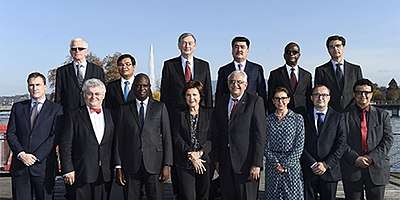Global High-Level Panel on Water and Peace
The Global High-Level Panel on Water and Peace was established on 16 November 2015[1][2][3] in Geneva[4] at the initiative of 15 co-convening UN Member States, i.e. Cambodia, Colombia, Costa Rica, Estonia, France, Ghana, Hungary, Jordan, Kazakhstan, Morocco, Oman, Senegal, Slovenia, Spain and Switzerland. Following the establishment of the Global High Level Panel on Water and Peace (hereinafter referred to as the Panel) and in response to the high interest generated, a Group of Friends on Water and Peace was created in early 2016. It provides a group of countries with an opportunity to interact with the work of the Panel and offers them a platform for regular dialogue on these issues. The Geneva Water Hub acts as the Secretariat of both the Global High-Level Panel and the Group of Friends on Water and Peace.
The focus of the Panel is the nexus between water and cooperation and maintenance of peace and security.[5] This includes preventive activities and arrangements, such as trans-border water cooperation regimes and institutions, protection of water infrastructure during armed conflicts and water arrangements in the context of post-conflict peace-building.
The Global High-Level Panel on Water and Peace will present a set of recommendations at the United Nations General Assembly in September 2017.
Objectives
The Global High Level Panel on Water and Peace aims at taking the issue of water in the context of maintenance of peace and security, from a technical to a political level. It has the following objectives:
- Develop a set of proposals aimed at strengthening the global architecture to prevent and resolve water-related conflicts;
- Facilitate the role of water as an important factor of building peace and cooperation; and
- Enhance the relevance of water issues in national and global policy making.
Mandate
- Panel members are serving in their individual capacity;
- The Panel is independent and is tasked with outlining concrete proposals and recommendations to enable water to be an instrument of peace. These proposals / recommendations will be non-binding, and will address policy issues at all levels (global, regional, national and local). However, the Panel will not make any country specific recommendations;
- The Panel is established for a period of two years, until the end of 2017;
- The mandate of the Panel comes from the fifteen co-convening countries;
- While the Panel functions outside the formal structure of the United Nations, it works in close cooperation with relevant stakeholders, notably with the UN which is represented in the Panel through UN-Water as observer. It is the only body serving in this capacity. The Panel holds consultations or hearings to get inputs from all relevant organizations and stakeholders;
List of Panelists
Chair
- Dr. Danilo Türk, former President of the Republic, Slovenia
Vice Chairs
- Mr. Mansour Faye, Minister of Water and Hydraulics, Senegal
- Dr. Alvaro Umaña Quesada, former Minister of Energy and Environment, Costa Rica
Members (by order of nomination by co-convening country)
- Prof. Laurence Boisson de Chazournes,[6] Professor of Law at University of Geneva, Switzerland
- Dr. Claudia Patricia Mora, former Vice Minister for Water and Sanitation, Colombia
- Dr. Pascual Fernández, former State Secretary for Water and Seashore, Spain
- Prof. Andras Szöllösi-Nagy, former Rector of UNESCO-IHE Institute for Water Education, Hungary
- His Royal Highness Prince Hassan bin Talal, Jordan
- Mr. Yerlan Nysanbayev, Vice-Minister of Ministry of Agriculture, Kazakhstan
- Mr. Mike Allen Hammah, former Minister for Lands and Natural Resources, Ghana
- Mr. Ciarán Ó Cuinn, Director of Middle East Desalination Research Centre, Oman
- Mr. Andres Tarand, former Prime Minister, Estonia
- Mr. Thor Chetha, Secretary of State of Ministry of Water Resources and Meteorology, Cambodia (acting on an interim basis, nominee to be announced)
- Mr. Franck Galland, Managing Director of Environmental Emergency & Security Services, France
- Mr. Abdelaaziz Ameziane, General Engineer, Ministry of Water, Morocco
 Global High-Level Panel on Water and Peace November 2015
Global High-Level Panel on Water and Peace November 2015
References
- ↑ "SFG - News". www.strategicforesight.com. Retrieved 2017-07-17.
- ↑ Hub, IISD's SDG Knowledge. "Event: Launch of the Global High-Level Panel on Water and Peace | IISD's SDG Knowledge Hub | IISD". Retrieved 2017-07-17.
- ↑ "Geneva Water Hub - Launch of Global High Level Panel - Swiss Water Partnership,". Swiss Water Partnership. 2015-12-03. Retrieved 2017-07-17.
- ↑ Geneva, United Nations Office of. "Where global solutions are shaped for you | The Director-General | Launching of the Global High-Level Panel on Water and Peace". www.unog.ch. Retrieved 2017-07-17.
- ↑ Narayanan, Dinesh (2015-11-18). "'Global High Level Panel on Water and Peace' to propose solutions to conflicts". The Economic Times. Retrieved 2017-07-17.
- ↑ "16 November 2015 - Professor Boisson de Chazournes is appointed as a member of the Global High-Level Panel on Water and Peace - Plateforme pour le droit international de l'eau douce - UNIGE". unige.ch. Retrieved 2017-07-17.